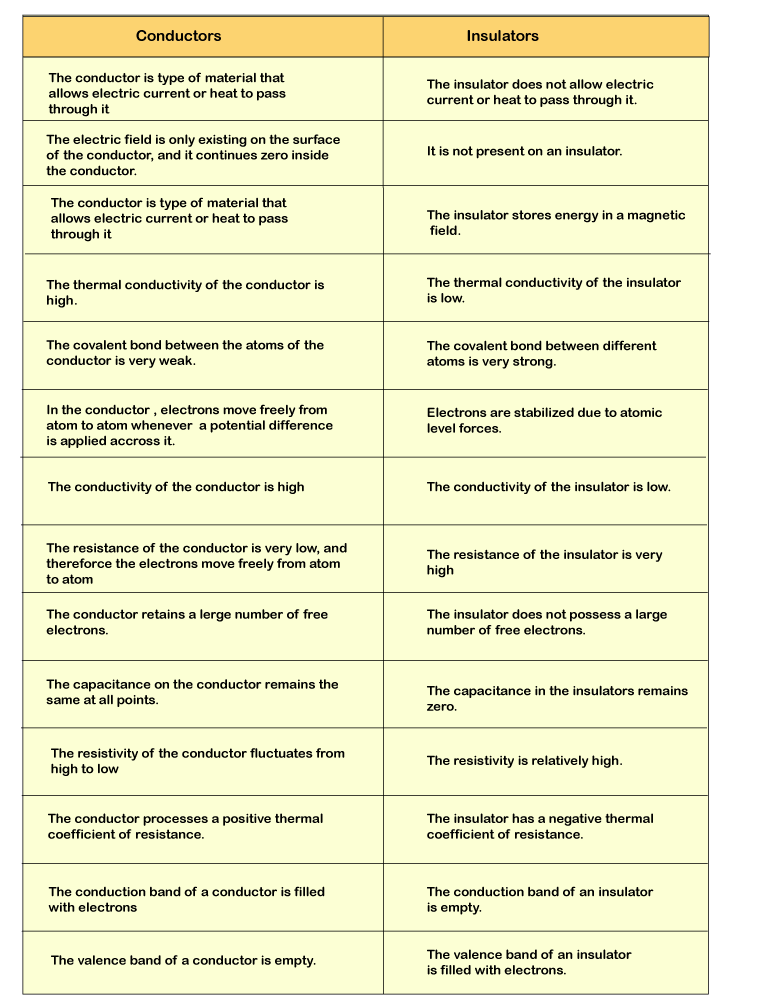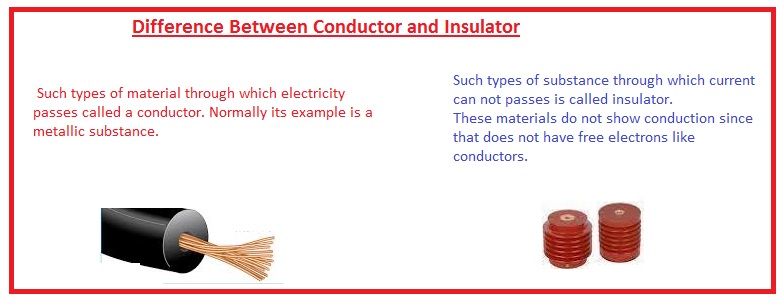Explain the Difference Between Conductors and Insulators
Mainly insulators are classified as solid materials due to the fact they offer a large resistance to the flow of current however metals are classified as conductors as they offer a small re. What is the Difference Between Conductors Semiconductors and Insulators.

Electrical Conductors And Insulators Definition Examples Diagrams
Conductors are defined as the materials or substances that allow electricity to flow through them.
. In contrast insulators are unable to generate any electrostatic fields because they have a lower charge density than that in conductors. When the insulator connects to the other electrical power devices the current will not flow in the circuit. A material that does not transmit electricity.
Conductors can store energy but. In conductors electrons are not bound to the particular crystal or molecules. The conductivity of insulators is low.
In the case of electricity a conductor transmits electrical energy between two points while an insulator blocks the flow of electricity. Conductors have free charges while insulators dont have free charges. Two examples of conductors are copper and silver.
A conductor is something which allows electric current to flow through it freely whereas an insulator prevents any electric current flowing through it. Conductors are able to generate enormous electrostatic fields because they have a higher charge density than that in insulators and metals. The difference between conductor and insulator If the material will conduct an electric current it is called a conductor If the material will not conduct an electric current it is called an insulator Insulating materials are therefore used as insulation for conductors by enclosing conductors such as wires in a layer of the insulation.
The main difference between the conductor semiconductor insulator is in its conduction state. However semiconductor conducts blocks at different conditions. A nonconductor also known as insulator is a material that does not transmit electricity.
Often in a number of systems insulators are used as they do not allow heat to flow. 2016 Insulators Materials that allow few free electrons are called insulators. Insulators The materials or substances that resist or dont allow the current to pass through them are insulators.
What is the difference between conductor and an insulator explain with examples. They are in general solid in nature. Examples are iron nail key safety pin water human bodyetc.
7 rows The most common difference between the two is that while conductors allow free flow of. Conductors conduct electric current insulator restricts the electric current Conductors have high conductivity and low resistivity whereas the insulators have low conductivity and very high resistivity. Flow of electricity along a conductor.
Copper is widely used as a conductor because it is one of the best conductors and is relatively inexpensive. Also known as insulator. A conductor is any material that conducts electricity.
The conductors always conduct electric current while the insulators do no conduct. Electrical charge can also move through materials known as semiconductors. Covalent bonds are weak therefore can be easily broken.
A conductor transmits something through its body with high efficiency while an insulator does not transmit very well. What is a Conductor. Explain the difference between a conductor and a nonconductor insulator.
Any material that conducts electricity. The charge density inside a conductor is always zero. Materials such as plastic rubber glass mica and ceramic are examples of materials that are good insulators.
Insulators which are also called dielectric are the materials or substances in which electrons cannot flow under the action of electric field. Electrical conductors are materials which a charge can move quickly. The electric field inside both conductors and insulators is zero.
16 rows The conductor and insulator are the types of material. When the conductor connects to other electrical power devices in the electrical circuit it forms a closed circuit. Conductors are the materials or substances which are having free electrons which can flow under the action of electric field.
The resistivity of conductors can vary from low to high. This is mainly because electricity can pass through conductors but not insulators. One of the major difference between.
The conductor have little resistance. Metals are mostly conductors of electricity while non-metals are mostly not. The temperature coefficient of resistance of the conductor is always positive.
Semiconductors are materials that are in between. The main difference between the conductor semiconductor and insulator is in their. In the car radiators conductors find their use in the eradication of heat away from the engine.
This circuit works as an open circuit. Describe the two types of electric current and give examples of each. Difference Between Electrical Conductor and Insulator Electrical conductors have zero or very little resistance while electrical insulators have very high or infinite.
Page 1-4 Siemens Industry Inc. Conductor connect with an Electrical Circuit Insulator in Electrical Circuit. When you put conductors in a circuit it would result in a closed circuit while when you put insulators in a circuit it would result in an open circuit.
Materials which do not allow electric current to pass through them are called insulators of electricity.

Difference Between Insulator And Conductor Javatpoint
How Does A Conductor Differ From An Insulator Quora

Difference Between Conductor And Insulator The Engineering Knowledge

No comments for "Explain the Difference Between Conductors and Insulators"
Post a Comment